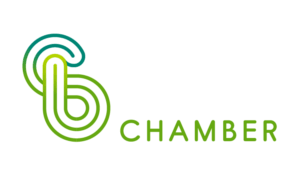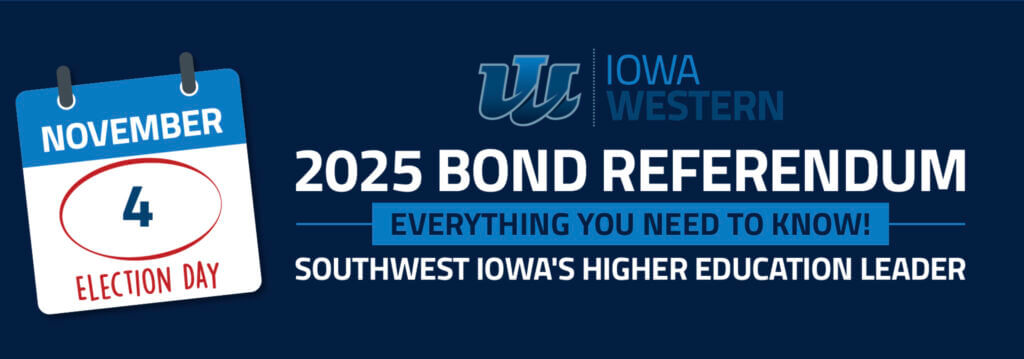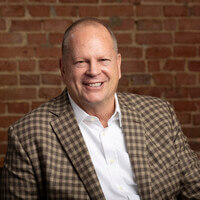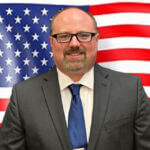2025 CHAMBER VOTER GUIDE
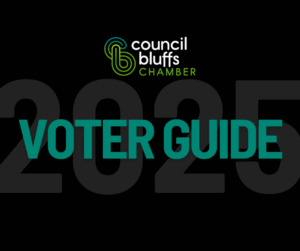
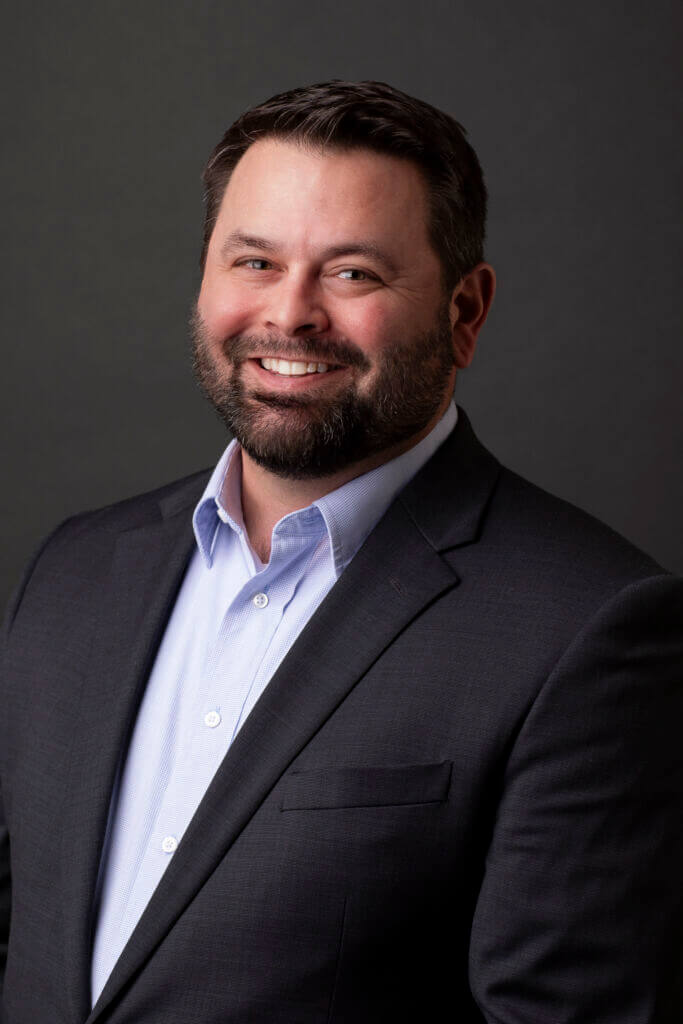
A Message From Your Chamber President
Local elections provide an important opportunity for residents to help shape the future of Council Bluffs. As our community prepares for the upcoming election, the Chamber is proud to provide this Voter Guide as a resource to inform and engage our members and the public. You will find important dates, links to useful resources, and perspectives shared directly by the candidates.
Our mission at the Council Bluffs Chamber is to strengthen businesses and build partnerships that promote economic growth and community development. Guided by this mission, we are committed to help build a future where Council Bluffs businesses thrive, workers succeed, and residents enjoy a vibrant quality of life. These goals helped shape the questions we posed to candidates, and their responses are included in this guide to help you make informed decisions as you head to the polls.
I am grateful to each candidate for stepping forward to serve. Running for office is no small undertaking, and I thank them for their leadership, as well as their participation in this Voter Guide.
I hope you find the information within these pages helpful, and I encourage you to take part in the upcoming election. Your voice and your vote play a critical role in shaping the future of our community.
Sincerely,
Chris LaFerla
President and CEO
Council Bluffs Chamber
The Council Bluffs Area Chamber of Commerce is a membership organization representing area businesses.
OUR MISSION: To strengthen businesses and build partnerships that promote economic growth and community development.
OUR VISION: To create a thriving community in the nation’s top economic growth region with opportunities unlike anywhere else.
GET PREPARED
ELECTION TIMELINE
OCTOBER 7, 2025 PRIMARY ELECTION
Polling Hours 7:00 AM to 8:00 PM
- SEPTEMBER 17, 2025 EARLY VOTING FOR PRIMARY ELECTION & FIRST DAY ABSENTEE BALLOTS ARE MAILED
- SEPTEMBER 22, 2025 LAST DAY ABSENTEE BALLOTS ARE MAILED
NOVEMBER 4, 2025 CITY & SCHOOL ELECTION
Polling Hours 7:00 AM to 8:00 PM
- OCTOBER 15, 2025 EARLY VOTING FOR ELECTION & FIRST DAY ABSENTEE BALLOTS ARE MAILED
- OCTOBER 20, 2025 LAST DAY ABSENTEE BALLOTS ARE MAILED
CB CHAMBER ELECTION EVENTS
Chamber Member Only Events
Primary Mayoral and City Council
Candidate Meet and Greet
Thursday, September 25
4:30-6:00 PM
Tish’s Restaurant
Mayoral and City Council
Candidate Meet and Greet
Thursday, October 16
4:30-6:00 PM
Guy Fieri’s Kitchen + Bar
Public Events
Primary Election Mayoral
Candidate Forum
Saturday, September 27
9:00-10:30 AM
Abraham Lincoln High School Auditorium
Primary City Council
Candidate Forum
Saturday, October 4
9:00-10:30 AM
Abraham Lincoln High School Auditorium
City Council
Candidate Forum
Saturday, October 18
9:00-10:30 AM
Abraham Lincoln High School Auditorium
Mayoral
Candidate Forum
Saturday, October 25
9:00-10:30 AM
Abraham Lincoln High School Auditorium
MAYORAL CANDIDATE QUESTION RESPONSES
Jill Shudak
Council Bluffs has experienced little to no population growth over the past 50 years and reversing that trend is critical to sustaining our economy and workforce. We need to focus on attracting and retaining young professionals and families. My goal is for the city to grow by 2% yearly. This rate of growth is attainable without straining city services.
A key strategy is to ensure affordable, high-quality housing options, ranging from starter homes to modern rentals and everything in between, so people can build their future here. We should also invest in family-friendly amenities, such as parks, trails, childcare, and cultural spaces, that make Council Bluffs a place where people would want to reside.
Expanding education and workforce partnerships is equally essential. Strengthening connections between local schools, Iowa Western Community College, UNO, UNMC, and employers can create clear pathways from education to good local jobs. Incentives for businesses to offer internships, apprenticeships, and career training will help retain homegrown talent.
Finally, the city should look to the Chamber of Commerce and Advance Southwest Iowa Corporation to attract new businesses that offer good-paying jobs and career opportunities. Along with a robust arts program via the Hoff Center and a welcoming, inclusive culture, these efforts will make Council Bluffs more attractive to young workers and families while building a resilient workforce.
Matt Walsh
I’ve heard citizens state that ever increasing property taxes are literally driving them from their homes. They are living on fixed incomes and the combination of rising property assessments coupled with the rising cost of living is exceeding any cost of living adjustments that they see in their social security check.
I have also heard other residents say that they love Council Bluffs and they want it to remain just as it currently is. I take pride in that, because after 30 years in office I have had direct involvement in the town that Council Bluffs has become. While both comments have validity, there is one overriding truth relative to financing government operations: Citizens want services and they also want tax reductions. The only way to accomplish both of these tasks is to continuously increase the overall number of contributing property taxpayers. A broader tax base where each taxpayer contributes their fair share toward covering the city’s fixed operating costs will help to reduce the individual burden of every taxpayer.
As far as urgency in population growth, it may be too late. Iowa’s population has increased in each of the last 12 years, but never by more than 1%. Iowa’s labor force participation rate has continued to slip since COVID and today is 67.4%. That means that many younger and older workers are not actively seeking employment. Said another way, 32.7% of Iowans are too young, too old, unwilling, or unable to work. The Iowa population composition is skewed towards elderly residents and subsequently more elderly workers are leaving the workforce than young workers entering to replace them. Not to mention the stress on the labor market of the deportation of undocumented workers, which impacts a variety of sectors, especially agriculture and food production.
Jill Shudak
I would start by strengthening partnerships with local schools, community colleges, and union trade programs to attract and retain young workers and families. The schools are the cornerstones of any community. The focus on working with the multiple school choices in our community needs to be a greater priority for the mayor.
For those entering into the workforce in our city, apprenticeships and career pathways would lead to good-paying, stable jobs right here in the area.
Expanding affordable starter homes and quality rental options will help young families put down roots. And there must be various housing options, including apartments, townhouses, row houses, and standalone housing.
Along with housing, quality of life is also essential. Childcare, parks, trails, and cultural amenities make Council Bluffs a great place to live and raise a family.
And bringing back a sense of community pride is essential. Council Bluffs is a vibrant, affordable community that gives young people leadership opportunities to shape its future.
Matt Walsh
Iowa has had exceptionally low levels of unemployment. Iowans are loyal employees--staying with an employer for 12 years on average, which is three times longer than the national average.
I believe that a detrimental factor to growing Iowa’s workforce involves the State’s reluctance to increase the minimum wage above $7.25 an hour. Paying workers poverty wages won’t incentivize in-migration of a skilled workforce.
Our Regents institutions provide residents an excellent education, but Iowa is the seventh highest nationally of net out migration as relates to our educated young people (Brain Drain). It is not a rosy picture for employers who decide to locate their business in Council Bluffs in regards to workforce attraction and retention. Traditionally a bedroom community, Council Bluffs for the first time during my lifetime has become a net importer of workforce. Each day around nineteen thousand individuals leave Council Bluffs for their employment, while more than twenty thousand workers migrate into Council Bluffs to work. This workforce migration is what sustains our local economy. There are complicating workforce factors when relying on migrating workers, one of which is those workers are continuously looking for employment closer to home. Rather than risk constant dilution in our workforce, we need to entice these workers to move closer to work, into our city and make it their residence.
There is a bright spot due to Council Bluffs Community School District’s dual degree initiative or ‘Plus One Pathways’ where students earn a high school diploma plus a second credential such as an industry recognized certificate or an Associate’s Degree--it is a game-changer for our local workforce. The workforce focus at Iowa Western on industry-recognized certifications will help develop the work skills of our local population and typically more community college educated graduates live and work locally.
Jill Shudak
Economic development is highly competitive across the Omaha/Council Bluffs metro, the Midwest, and the nation. Communities are all striving to attract investment, talent, and development opportunities.
I believe the role of city government is to be a supportive partner to organizations such as the Chamber of Commerce and the Southwest Iowa Initiative, which are already leading recruitment and business development efforts. These groups bring the expertise and connections, while the city's role is to create the conditions for success.
The city can do this by investing in infrastructure. The roads, utilities, broadband, and public spaces help enable growth, and we streamline the permitting and zoning processes to improve businesses' efficiency and predictability. Using incentives wisely, focusing on projects that create long-term jobs, strengthen the tax base, and revitalize key areas would support workforce development. These partnerships, along with schools and training programs, will enable labor pools to enhance the quality of life through housing, transportation, recreation, and cultural amenities that attract and retain employers and employees.
By focusing on these priorities, the city strengthens rather than duplicates the work of its economic development partners. This collaborative approach positions Council Bluffs to compete successfully for new business investment while ensuring existing businesses continue to grow and thrive.
Matt Walsh
The staff of the City of Council Bluffs works hand in hand with our economic development professionals at Advance Southwest Iowa to recruit new business and industry to Council Bluffs. Because I was a commercial banker for 28 years, I am well-versed in the language of real estate developers and negotiation. Council Bluffs has a very knowledgeable staff that add value to the economic development process. They understand the challenges to building infrastructure, they are well-versed in code compliance, storm water management, and building permits. We have city planners and civil engineers that can provide professional guidance on how to make a project happen while meeting City codes.
Our two main incentives for negotiation are known as "Urban Revitalization" (tiered percentages of tax abatement) or "Urban Renewal" (tax increment financing--percentages of tax rebates on taxes paid). Each project is unique in its location, infrastructure, and needs. If it is a business that the City thinks will bring desirable employment and/or significant property tax base, we negotiate incentive terms that help the business close their initial financing gap.
Regardless of whether it is Urban Revitalization or Urban Renewal, it should be understood that the "incentive" is coming entirely from taxes that are generated on the new value of the project, not money from our current tax payers. In short, without the increase in tax base from the completed project, there is no incentive available for us to offer. In the shorter term, the new businesses are paying some new property taxes that were previously not there. In the long-run, when the negotiated term of the incentive runs out, the City benefits from full valuation and therefore full property tax collection, which broadens the overall city tax base.
Jill Shudak
I bring extensive experience in managing multi-million-dollar budgets, meeting deadlines, and communicating project updates. In previous roles, I ensured complex financial plans were executed on time and within budget, while ensuring that projects met both fiscal and operational goals. This background has given me a strong understanding of how to align financial oversight with day-to-day operations.
A city budget is both a financial plan and a reflection of community values. Revenues generally come from property taxes, sales taxes, service fees, and intergovernmental funding. These funds support essential services, including public safety, public works, utilities, transportation, housing, and community programs. Some funds are restricted for specific uses, while general fund dollars allow more flexibility in addressing priorities.
If entrusted with developing and managing the city’s budget, I would begin with an internal review of every department within the first 90 days. This audit will help identify current strengths, challenges, and opportunities for efficiency. From there, I would take a disciplined and transparent approach: engage the community, project revenues conservatively, fully fund core services, and maintain reserves for long-term stability. I would closely monitor progress against the budget, provide regular updates, and make mid-year adjustments as needed.
My priorities would include public safety, maintaining reliable infrastructure, and ensuring essential city services are protected. I would also prioritize strategic investments in affordable housing, economic development, and community amenities. With my proven experience in managing large budgets and my knowledge of contracts and construction, I am confident in my ability to ensure projects and services are delivered effectively, responsibly, and in line with community priorities.
Matt Walsh
I have extensive budgeting experience. Budgeting is the key road map to successful business planning. I was a commercial banker for 28 years where I worked hand in hand with metropolitan area business owners, helping them prepare annual pro forma budgets and then at year-end comparing the actual results to their projections.
Additionally, I can read Income Statements and Balance Sheets. Budgeting involves analyzing business trends, inflation factors, impacts to the regional economy, anticipating vendor pricing, and wage and benefit projections. Budgets are not a science; they are an art. At any time during the year, you should be able to compare actual revenues and expenses to your budget projects so that you can evaluate whether you are on the right track. If variances are significant, then course corrections can be made where appropriate.
In my first full year as Mayor, the finance director retired and at the last minute, his replacement decided she didn’t want the job. I successfully prepared the entire $130 million City budget that year. That experience was a trial by fire that taught me a lot about municipal budgeting and prioritization under fiscal constraint.
We always prioritize public safety and infrastructure. Funding sources are limited and some define how they may be spent. For example, Road Use Tax is available exclusively for road maintenance materials, equipment, and personnel. On the other hand, the Police and Fire Departments are primarily funded through the General Fund, which is mainly comprised of property tax; yet another reason we need to grow our property tax base--so we can continue to provide a high-level of public safety.
Jill Shudak
I will focus on completing the development of the city-owned land on First Avenue and East Manawa. In addition, completing the Riverfront development at the old Playland Park area will create an exciting opportunity to establish new destination areas within the city. We can create inviting spaces that attract new residents, visitors, and investment by finishing these projects.
Vibrant, well-designed corridors and a thriving downtown are essential to Council Bluffs’ identity, perception, and long-term economic momentum. First Avenue, West Broadway, the riverfront, and our historic downtown are all gateways into the community and serve as focal points for housing, business, entertainment, and civic life.
To spur redevelopment, I support using a combination of public-private partnerships, targeted tax incentives, and infrastructure investments that make these areas shovel-ready for businesses and housing. Strategic use of tools such as tax increment financing (TIF), workforce housing incentives, and streamlining the permit process can accelerate progress. Equally important is ensuring high-quality design standards and community amenities so that these corridors become destinations that strengthen our city’s appeal and economic vitality.
Matt Walsh
Our mission is to continuously improve the quality of life and attractiveness of the city of Council Bluffs. Arriving at an authentic ‘Sense of Place’ involves a multi-faceted process that requires a deeper understanding of how people will perceive and experience the built environment. That environment needs to become enriched in a way that makes it feel authentic, welcoming, and unique. It should present an atmosphere that promotes human interaction and instills a sense of belonging. Most successful ‘public spaces’ provide diverse opportunities for people to live, work, play, and gather. Attention to streetscapes, landscaping, compatible land uses, and quality building materials are all important components. When done effectively, real estate developers will have confidence that once the plan has been developed, that it will be implemented as designed. Developers will seize on the opportunity to become part of the ‘vibe’, while also having their investment protected by ensuring that neighboring properties will be held to a similar standard of quality.
Quite often the City helps create the design concepts related to the planned environment. It also will help fund the infrastructure components; streets, sewers, lighting, and plantings. The cost of those components then get repaid through a tax increment financing (TIF) rebate agreement. If new private construction is involved, then economic development incentives will likely be requested. As long as the math works to the long term benefit to the City, it is worth the time and investment.
Attention to design in the key areas of the riverfront, FIRST AVE/West Broadway, and downtown is important--especially in creating attractive environments for future residential development. We need the housing and the property tax base, but quality development does not spring up out of nowhere; we need to create those conditions for success through thoughtful design consideration for all residents.
CITY COUNCIL CANDIDATES
CITY COUNCIL CANDIDATE QUESTION RESPONSES
Cole Button
Responsible, sustainable population growth is important to ensure our city remains vibrant and economically strong. Growth brings opportunities—more businesses, a stronger workforce, and an expanded tax base that helps us maintain quality city services without placing a heavier burden on current residents.
As someone with a background in finance and banking, I understand the importance of balancing growth with fiscal responsibility. Expanding our population and economic base is essential to keeping our city’s finances healthy, but it must be done thoughtfully. Our focus should be on smart growth that fits the character of Council Bluffs and improves the quality of life for the people who already call it home. This means addressing housing shortages with practical solutions, investing in infrastructure, and ensuring that our schools, parks, and public safety services keep pace with new development.
We don’t need to double in size overnight, but we should take proactive steps to attract new families and workers who will contribute to the community. This includes supporting local businesses, making Council Bluffs a welcoming place for entrepreneurs, and promoting the unique strengths of our city.
Ultimately, my vision is a balanced one: growing in a way that creates opportunity while protecting what makes Council Bluffs special. By planning carefully, we can secure long-term economic growth without losing the character that we all value.
Steve Gorman
Density is the most important discussion within our community. We have been stagnant in our population for many decades, my whole life basically, and it has become increasingly difficult to afford the communities needs including roads, public safety, the police force, and firefighters.
There are three things we need to look at: housing, jobs, and quality of life within our community. These core values are necessary to bring in young professionals who are looking for a safe community to work and raise their families.
We need to increase our population by 25 thousand people in the next 25 years, or a thousand people per year. This will allow for growth of infrastructure needs as well as an increase of tax base to sustain our community.
All one needs to do to know that we need an increase of a taxable base is to look at the roads. Roads are funded by the gas tax that is distributed by population base. So the farther we sprawl as a community without an increase of population, the harder it is to maintain the road services. We are taking the same amount of money and trying to stretch it farther and farther each year.
If we do not grow, the same number of people will continue to pay an increase in taxes each year; therefore, we must grow to maintain an equitable community.
Dustin Harris
We need growth to increase our tax base to pay for current expenditures and to prepare for the future. I would like to see an additional three to five thousand residents in the next 5 years. We should be pushing for mid to high income apartments that would create higher tax income per square foot than lower income apartments that we already have a lot of across the city that just bring in problems from outside the city and use up resources, like Police and Fire, while not providing much in the way of taxes to reimburse the city for those services. We also need to make sure these new projects are viable before we start talking to builders and spending money in the planning stages. I would also require binding letters of intent ensuring that we are able to fill commercial building projects before we start spending money on them so we don't have offices or buildings sitting empty for years, like past projects. We also need to consider limiting the time-frame on tax-free incentives that we offer to bring in businesses that would likely build here anyway due to much lower taxes than Omaha. If there's better options for them and we would greatly benefit from the business then we could offer more incentives but get promises in legally binding contracts so that we aren't left with less permanent jobs than promised, like the first Google project.
Another consideration is that we currently need another fire station in the south end to ensure rapid deployment and availability of life saving resources. We already own land near the Mid-American Center to build on but we need to make sure that we plan ahead on any new projects to build a large enough station with adequate equipment and staffing along with thinking about a Police substation with thoughts on future growth so that we aren't short staffed and paying out massive amounts of forced overtime.
Jessica Vanderpool
I do think population growth is important for the future of Council Bluffs, but it has to be done the right way. More people living here means more support for our local businesses, a stronger tax base to keep up city services, and a bigger workforce for employers. That helps us stay competitive with nearby cities.
At the same time, I understand why some people want to keep things the way they are. Council Bluffs has a great small-town feel, and I don’t want to lose that. Growth doesn’t have to mean changing who we are, it just means planning so we can keep improving while protecting what makes this community special.
To me, it’s not about hitting a certain number of people. It’s about smart growth, making sure we have enough housing choices, good jobs, and amenities that make families and businesses want to put down roots here. If we focus on those things, the population will grow naturally and at a pace that feels right for the community.
Cole Button
Attracting and retaining young workers and families is critical to Council Bluffs’ long-term success, and we need a strategy that balances the needs of both businesses and residents. At 29, I can offer a younger person’s perspective on what makes a community appealing to the next generation, while also recognizing the challenges faced by long-time residents.
Housing is a top priority. Young professionals and families want affordable, safe, and modern options. At the same time, I’ve spoken with retirees who have lived here for decades but are now considering moving because rising property taxes are straining their fixed incomes. We need a balanced approach—encouraging responsible development while keeping our community affordable for those who built their lives here.
Opportunity and quality of life must go hand in hand. With my background in finance and banking, I know how important it is to support small businesses, encourage entrepreneurship, and strengthen partnerships with schools and community colleges. But jobs alone aren’t enough. Many young people don’t move to or stay in Council Bluffs because most entertainment options are across the river in Omaha. To compete, we need more local amenities—restaurants, entertainment venues, cultural activities, and family-friendly recreation—that make people want to live and spend their time here. These improvements also benefit local businesses and expand our tax base.
By pairing economic growth with affordability and stronger quality-of-life features, Council Bluffs can attract new families and workers while protecting the residents who have long called our city home.
Steve Gorman
There are three things we need to look at: housing, jobs, and quality of life within our community. These core values are necessary to bring in young professionals who are looking for a safe community to work and raise their families.
With housing and rent availability under 2%, our young people have to look elsewhere to live. This then encourages them to take their professional talents closer to their new homes. The number one priority of our city council should be increasing housing.
The talent we need can be created locally. We need to utilize Iowa Western Community College as a work force development to meet the needs of our community through technical and professional education. This will create a more skilled and talented workforce which will bring higher pay and a better standard of living for our community. Those who graduate at Iowa Western will be incentivized to stay within our community by partnering with Iowa Western’s educational planning to make sure it complements the industries we have within our community.
The more affordable we make our community to live, the more likely young families will be able to afford childcare. This will increase the quality of life of these young families. Parents understand that children are the future of our community and it will incentivize parents to invest more into the safety and future of our community.
Dustin Harris
The two main complaints that I hear from people who have left our city are the schools and crime/homeless. A large portion of our city workers no longer live in the city and I know a lot of people that have moved to rural and small towns with long commutes rather than deal with these issues.
We need to ensure our schools have high educational standards and deal with issues that arise so that parents aren’t leaving the city.
As far as crime/homeless issues, we need a multi-layer approach to deal with these issues more effectively. We need to look into the possibility of either adding onto the jail or building a separate specialized facility to house arrests that are too intoxicated, high on drugs, mentally ill or have superficial injuries that the jail generally refuses to take without medical clearance at the ER but aren’t bad enough for the city to pay for thousands of dollars in care at the ER’s and tie up one, sometimes two officers for the ER staff’s safety which causes staffing issues on the street.
We need to increase officers and move code enforcement under the Fire Department to allow for more checks and balances and to ensure that problem housing areas, where criminals tend to hang out, aren’t ignored. If the owners can’t bring these problem locations back up to code then we can look at condemning them and bringing in private funds and grants to bring them up to code to provide housing for local families in need, veterans, and other homeless individuals that are drug free, mentally stable and aren’t causing problems.
More officers means more time to deal with crime prevention and clearing homeless camps.
We also need to require more oversight for the shelters that we let operate in the city. One shelter alone had 879 police and medical calls for service last year while they get large amounts in grant funding. I would also push for requiring positive identification of those living there and have police work to make sure that we aren’t letting violent mentally ill people, active drug dealers and convicted sex offenders stay in our facilities.
Lastly, we need to clear out public spaces of all camps, many that I have personally seen over my almost 24 years as a CBPD officer had sex offenders avoiding registration and many had long criminal histories or active warrants and tend to have violent incidents in and around them by people that are on drugs.
Jessica Vanderpool
I believe one of the best things we can do for the future of Council Bluffs is attract and keep young professionals and families. That means building a community where people want to live, not just work.
A big opportunity is with people who already work here but live somewhere else. If we can offer more housing options, strong schools, and the kind of welcoming community that makes people feel at home, we can turn those workers into neighbors.
I also think about our students who leave for college or other opportunities. If we stay connected with them and show them the opportunities here, they’ll be more likely to come back and start their careers and families in Council Bluffs.
Housing is a big part of this, whether it’s starter homes, rentals, or family neighborhoods, people need choices at different stages of life. On top of that, safe neighborhoods, parks, trails, and strong local businesses make a city vibrant and attractive to younger generations.
For me, it comes down to making Council Bluffs a place where people feel proud to stay and excited to come back.
Cole Button
Economic development is increasingly competitive, and Council Bluffs must position itself as a community where businesses can thrive and families want to live. While private and nonprofit partners play key roles, city government sets the foundation through policy, infrastructure, and collaboration.
First, the city should focus on creating a business-friendly environment. That means keeping taxes and regulations fair and predictable, investing in reliable infrastructure, and streamlining permitting and approval processes so businesses can expand or locate here without unnecessary delays. With my background in finance and banking, I know how much predictability matters when businesses decide where to invest.
Second, we need to support our existing businesses as much as we work to attract new ones. That includes strengthening partnerships with the Chamber, schools, and community colleges to ensure our workforce has the skills employers need. It also means listening to small business owners and entrepreneurs and making sure they have the tools to grow—from access to financing to mentorship opportunities.
Finally, quality of life is a major part of economic development. When workers and families choose Council Bluffs because of our schools, neighborhoods, entertainment, and recreation options, it makes us more attractive to businesses deciding where to invest. City government should see economic development not just as recruitment, but as building a community where people and businesses alike want to put down roots.
By combining fiscal responsibility, business-friendly policies, and investments in livability, we can give Council Bluffs a competitive edge in attracting and retaining both businesses and talent.
Steve Gorman
We need a mix use strategy for development. This means that we can have shared spaces for housing, storefronts, and entertainment. This also includes green spaces and public transportation. Walkable communities are a modern attraction for young professionals and to incentivize young people into our community we need to create some within our city.
We want to create our developments in a manner that utilizes both space and structures that we currently have. We can develop and utilize our space better by growing skyward as opposed to urban sprawl. Adding on top of already established infrastructure decreases costs and increases the gain to our community as a whole.
Ultimately, the state, Council Bluffs, and the metro area need to work collaboratively in order to bring in more businesses and economic growth to sustain the standard of living for our community which will in turn attract new young professionals and their families. By attracting these new young professionals, this will create a larger tax base which will help our current small businesses keep their taxes affordable, and will create a larger pool of talented workers within our community. We need to grow in a coordinated structured manner that keeps us within a sustainable budget while pursuing progress for the benefit of the future of our community.
Dustin Harris
One of the biggest issues current business owners have complained to me about is theft and customers being scared away due to the homeless. The downtown, west and south end stores have people passed out on or near their properties or they have what they describe to me as homeless people actively stealing and attempting to burglarize their stores in broad daylight. One cell phone store just caught one of the homeless people that sleep behind their store trying to beat the lock open to gain entry during business hours. They also have health and safety issues like drug use and using sinks to bathe in the bathrooms. If we want to attract new businesses these issues must be addressed immediately using the approach I outlined in the last question.
We also need to get our roads, sewers and water mains repaired. We all know of at least one place in town that smells like raw sewage all day long every time you drive by it. People drive to west Omaha rather than shop locally not to deal with these issues. If we address this and the homeless issues, more businesses will come to the shopping areas we’ve already built, some of which have sat empty for years. We can offer tax free incentives to bring in large companies but we need to be vigilant in not giving them long time frames with no taxes when some of them would come to the city anyway rather than deal with Omaha’s higher taxes. We also need to get promised permanent job numbers in writing to make sure that we aren’t left with a lot less permanent jobs than promised like the first Google project.
Jessica Vanderpool
I believe the city plays a key role in economic development by setting the vision for the community and then working alongside local partners to turn that vision into reality. Economic growth isn’t something the city can do alone, it takes collaboration with businesses, nonprofits, and educational institutions to create real opportunities for our residents and companies.
For me, supporting the businesses we already have is a top priority. Helping them thrive and grow strengthens our local economy and creates the kind of momentum that attracts new businesses naturally. That might mean helping businesses navigate city processes, connecting them to resources, or checking in regularly to see what they need to succeed.
We also face competition, neighboring states, like Nebraska, offering lower business taxes, so we need to be creative in finding ways to make Council Bluffs attractive for companies. That could include targeted incentives, workforce development programs, or investments in amenities and quality of life that make our city a place where people want to live and work.
At the end of the day, economic development is about more than just jobs—it’s about building a strong, vibrant community where businesses can succeed, families can thrive, and Council Bluffs can compete for talent and investment. By working together, I believe we can make that happen.
Cole Button
Developing and managing the city budget is one of the most important responsibilities of the City Council, and it requires both technical understanding and a commitment to reflecting the priorities of our community. I bring a strong background in this area. I earned a finance degree from Iowa State University and have spent several years working as a financial analyst, where I studied budgets, analyzed spending, and helped organizations plan responsibly for both short- and long-term needs. This experience has given me a clear understanding of how to balance resources, identify efficiencies, and make data-driven decisions.
A city budget is largely funded through property taxes, local option sales taxes, fees, and state and federal support. These revenues pay for essential services like public safety, infrastructure, parks, and sanitation. The challenge is to ensure that these funds are allocated in a way that maintains core services, invests in growth, and keeps our city affordable for residents—especially retirees and families who are struggling with rising property taxes.
My approach would be rooted in fiscal responsibility and transparency. I would prioritize essential services like police, fire, and public works while also making targeted investments in areas that improve quality of life, such as housing, parks, and community development. I would also work to identify underutilized funds or inefficiencies that could be redirected toward higher priorities, ensuring every tax dollar is used wisely.
In short, I bring both the technical expertise and the community focus needed to develop a budget that keeps Council Bluffs strong, sustainable, and affordable.
Steve Gorman
As a city councilman for the last four years, I have, in cooperation with the rest of the city council, overseen the city budget each year for approval. We have intelligent minds who work out all the details on the city staff. Each department head puts their own budgets together with approval of the mayor, but it is up to the city council to make sure that the budget as a whole stays within our city levy.
Our city levy is determined by the property tax evaluation by the state. In addition, we have an one cent optional sales tax that is essential to spur economic development within our community. We also utilize tax increment financing to help incentivize businesses to come into our community instead of settling on the Nebraska side of the river.
Affordable housing is the top priority within our community. Bigger businesses may look at our community and see that we do not have enough housing availability for their work force, so they choose to settle elsewhere. This is a preventable harm to our community. We have less than 2% availability in each rental and housing availability demographics. This increases the pricing of homes and rents, which decreases the incentive of new young professionals from settling in our community while also increasing the number of our neighbors who become homeless. Our community deserves better, and growth is the answer.
Dustin Harris
I have never run my own corporation or non-profit and I have never directly worked on a government budget. I, like some of the other candidates, have experience limited to personal finances.
My understanding of the city budget is that each department gets their budgets and employee contracts approved by the council. Our sources of income are mainly property taxes, local sales tax, a variety of fees and permits, citations and grants.
I would like to have talks with the Finance Director and heads of all the departments and see where we can improve and where we can cut. I would also seek out city workers, of whom I know many, and get their opinions on current spending and see where we can cut and what we need to spend more on.
We need to prioritize public safety and increasing our tax base, which increasing public safety will help with. Cleaning up the parts of town that detract from our great city is the first step at shedding the image others have for us and help with attracting new businesses and residents to increase our tax base. This will allow us to push broader initiatives like working with the county to build a facility for mental health and add onto our jail so that we can keep the people creating the most public and often reported offenses off the street longer and provide relief to businesses and residents.
Jessica Vanderpool
In my role as Director of Sales for two hotels and a catering company, I do not create the full budget, our General Manager does, however I work closely with him on a complex and multi-faceted sales budget. I track revenue goals, analyze results across multiple properties, and help plan strategies to hit our targets. Managing budgets at this level has given me a strong understanding of how budgets work, how to prioritize, and how decisions in one area impact the bigger picture. Serving on the Chamber Board of Directors and the 712 Initiative Board has also given me insight into how nonprofits manage limited resources and make choices that have real impact.
City budgets are more complex, of course, but the same ideas apply. Revenues come from things like property and sales taxes, fees, and grants, and some of those funds have rules about how they can be used. City services, from public safety: police and fire, to public works and more, depend on using those dollars responsibly.
If I’m elected, I’d approach the budget by listening to the community, reviewing the numbers carefully, and focusing on what matters most. Public safety, infrastructure, and quality-of-life projects would stay top priorities, while also looking for ways to invest in long-term growth, like workforce development and amenities that make Council Bluffs a great place to live. Transparency matters to me, too. I want residents to know how their tax dollars are being used and to see that we’re making thoughtful choices that reflect our community’s values.
Cole Button
Vibrant corridors and a thriving downtown are essential to Council Bluffs’ identity and long-term economic momentum. First Avenue, West Broadway, the riverfront, and our historic downtown are gateways to the community and the first impression for visitors, businesses, and potential new residents. My vision is to strengthen these areas in ways that respect our city’s character while attracting new investment and opportunities.
I believe our focus should be on practical, achievable redevelopment of underutilized areas within the city. Examples include older commercial strips along West Broadway, vacant lots near downtown, and former industrial sites near the riverfront. These areas offer real opportunities for new housing, businesses, and entertainment without displacing the community assets residents value most.
To spur redevelopment, I would support tools such as tax increment financing (TIF) when used responsibly, targeted infrastructure improvements that make sites “investment-ready,” and public-private partnerships with developers committed to projects that fit our community’s needs. Just as importantly, I would prioritize corridor beautification and amenities that make these spaces inviting—walkability, green spaces, and family-friendly attractions.
By focusing on smart redevelopment of underutilized areas, we can expand housing options, strengthen downtown, and attract businesses and visitors, all while preserving the landmarks and open spaces that make Council Bluffs a place people are proud to call home.
Steve Gorman
I would like to see an enterprise zone down our core, stretching from where we connect to downtown Omaha, continuing through the 100 Block, and ending at Iowa Western Community College. I would like this to be roughly six blocks wide. In this area, we would match the taxation of downtown Omaha. This would eliminate the gap financing challenges we currently have with Omaha and would allow for more growth in business, entertainment, and civic life.
We need help from the state of Iowa; the state needs to work with our community. As a border town, we have to compete with our neighbors in Nebraska, and we need to have policies that can help support the economic differences between our borders. We are the only border city in Iowa that is the minority to the connecting border city. We need the state on our side to expand the tax structure to be able to compete and expand our infrastructure.
This does not mean that we are trying to mimic Omaha. This is a means to obtain the tools we need to incentivize young professionals and businesses to come into our community. We will always be uniquely Council Bluffs, but we can take our small town feel and expand it with the growth of our community.
Dustin Harris
I would like for people to see a clean city free of people passed out on benches and in business parking lots before we get to work on new projects. We have spent a lot of money on areas that are constantly hit with public indecency, vagrancy, theft and violence like the 1 st Ave, River’s Edge, 100 Block and city parks. Once we have that under control and our own citizens feel safe, we can move into revitalization and adding to the business districts at River’s Edge, downtown and in the vacant lots around the Mid-American Center and on S. 24th St. I would like to see open-air shopping centers and a variety of new restaurants that we currently have to travel to Omaha for.
Jessica Vanderpool
I see redevelopment in Council Bluffs, particularly along the riverfront and downtown, as an important topic for the city. These areas play a key role in the city’s identity and long-term economic momentum, and I believe it’s important to carefully explore opportunities for new investment while preserving the character of our community. While I am not currently familiar with the zoning details, this is something I would need to explore further if elected, however, one idea I find interesting is the potential for a boutique hotel with event space in downtown Council Bluffs. A boutique hotel downtown could help attract visitors and events looking to be in a more downtown area, while also supporting nearby restaurants, shops, and entertainment, contributing to a more vibrant core.
I want to ensure we are considering all opportunities that can enhance our city and strengthen our tax base. Thoughtful development along the riverfront is one area worth discussing. Done correctly, it could help Council Bluffs grow as a vibrant destination for residents and visitors alike, while also providing new opportunities for housing, recreation, and community events.
It’s important to note that the city would not be the developer. The role of the City Council would be to review bids and plans from private developers, while creating an environment that encourages responsible investment. Tools like tax increment financing (TIF), targeted incentives for projects that align with community goals, and zoning that allows for mixed-use development can all help guide this process. Supporting public-private partnerships and engaging the community early are also key to ensuring projects succeed and reflect the vision of our residents.
I believe we need to start having these conversations now and plan thoughtfully for the next 5, 10, and 15 years. Any development opportunities should focus on creating well-designed, vibrant spaces that attract residents, businesses, and visitors while preserving the unique character of Council Bluffs.
